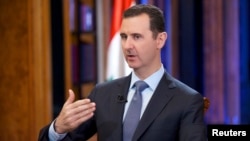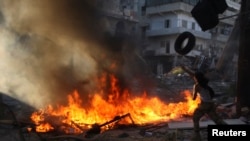Syrian President Bashar al-Assad is not ruling out the possibility of a United States military strike on his country despite agreeing to a deal requiring him to give up his chemical weapons.
Speaking to Venezuela's Telesur television, President Assad said his government remains committed to the deal negotiated by the U.S. and Russia, which is in the final stages of being formalized by the United Nations Security Council.
Assad said he sees "no serious obstacles" to the plan, but warned that terrorists, a phrase he uses to describe rebels, could try to prevent U.N. experts tasked with securing the government's chemical weapons stockpile from doing their job.
The deal emerged after the U.S. threatened airstrikes to punish his government for a poison gas attack last month on a rebel-held area that killed hundreds. Assad denies carrying out the attack.
The U.S. delayed the airstrikes after Assad agreed to the deal, but the Syrian leader told Telesur that the possibility of what he called U.S. "aggression" was always there, whether the "pretext" was chemical weapons or "something else."
His comments, which aired late on Wednesday, came as U.N. chemical weapons inspectors returned to Syria to investigate multiple incidents where chemical weapons were allegedly used.
The team of experts, led by Swedish chief Ake Sellstrom, has already determined that the deadly nerve agent sarin was used in the August 21 attack near Damascus. The investigators' mandate does not include assigning blame for any of the attacks.
Meanwhile, in New York, diplomats are continuing to work on a U.N. Security Council draft resolution that would enforce the U.S.-Russian chemical weapons deal.
U.S. Secretary of State John Kerry and Russian Foreign Minister Sergei Lavrov met Tuesday on the sidelines of the U.N. General Assembly, but failed to agree on the key points of the document. The U.S. and Russian ambassadors to the U.N. are tasked with working out the final language.
Russia opposes a resolution that mentions Chapter VII of the U.N. charter, which includes the use of military and non-military action to enforce decisions.
Russia has long opposed the idea of military intervention, and has vetoed three attempts to sanction Syria at the U.N. Security Council.
Russian Deputy Foreign Minister Sergei Ryabkov said Tuesday the resolution could mention the Chapter VII article that permits force or sanctions only if the U.S.-Russia chemical weapons accord is violated by either side in the Syrian conflict.
Photo Gallery: Latest Images from Syria
Speaking to Venezuela's Telesur television, President Assad said his government remains committed to the deal negotiated by the U.S. and Russia, which is in the final stages of being formalized by the United Nations Security Council.
Assad said he sees "no serious obstacles" to the plan, but warned that terrorists, a phrase he uses to describe rebels, could try to prevent U.N. experts tasked with securing the government's chemical weapons stockpile from doing their job.
The deal emerged after the U.S. threatened airstrikes to punish his government for a poison gas attack last month on a rebel-held area that killed hundreds. Assad denies carrying out the attack.
The U.S. delayed the airstrikes after Assad agreed to the deal, but the Syrian leader told Telesur that the possibility of what he called U.S. "aggression" was always there, whether the "pretext" was chemical weapons or "something else."
His comments, which aired late on Wednesday, came as U.N. chemical weapons inspectors returned to Syria to investigate multiple incidents where chemical weapons were allegedly used.
The team of experts, led by Swedish chief Ake Sellstrom, has already determined that the deadly nerve agent sarin was used in the August 21 attack near Damascus. The investigators' mandate does not include assigning blame for any of the attacks.
Meanwhile, in New York, diplomats are continuing to work on a U.N. Security Council draft resolution that would enforce the U.S.-Russian chemical weapons deal.
U.S. Secretary of State John Kerry and Russian Foreign Minister Sergei Lavrov met Tuesday on the sidelines of the U.N. General Assembly, but failed to agree on the key points of the document. The U.S. and Russian ambassadors to the U.N. are tasked with working out the final language.
Russia opposes a resolution that mentions Chapter VII of the U.N. charter, which includes the use of military and non-military action to enforce decisions.
Russia has long opposed the idea of military intervention, and has vetoed three attempts to sanction Syria at the U.N. Security Council.
Russian Deputy Foreign Minister Sergei Ryabkov said Tuesday the resolution could mention the Chapter VII article that permits force or sanctions only if the U.S.-Russia chemical weapons accord is violated by either side in the Syrian conflict.
Photo Gallery: Latest Images from Syria






